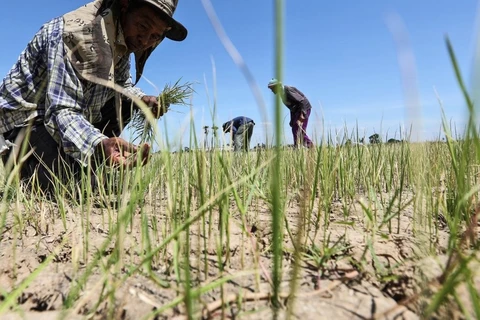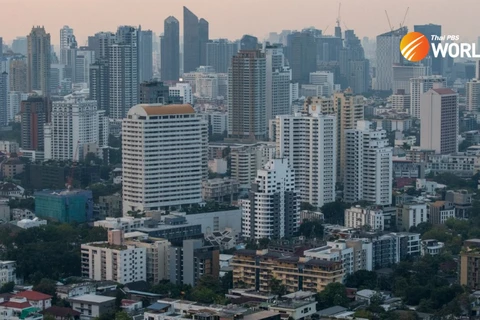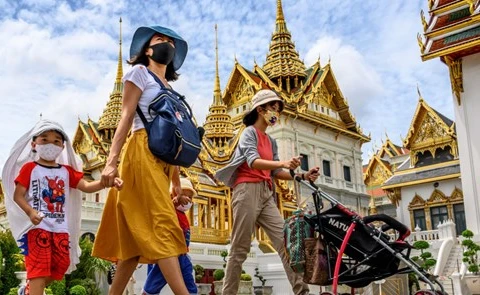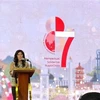Bangkok (VNA) – To realise its climate commitments, Thailand is beginning to shift to a Bio-Circular-Green (BCG) economic model that balances promoting economic growth and protecting the natural environment.
The government has outlined an “Environment Map” to promote the smart use of natural resources and reduce the impacts of climate change, as well as move towards a low-carbon society in all areas of the country by 2027.
At the 26th UN Climate Change Conference (COP26)taking place in Glasgow in 2021, Thailand committed to achieving the goal of being carbon neutral by 2050 and bringing greenhouse gas emissions to zero by 2065. The Southeast Asian country also strives to increase its national contribution to reduce 30-40% of greenhouse gas emissions by 2030 from the previous target of 20-25%.
In the tourism sector, Thailand has introduced a series of measures including the closure of some tourist attractions in a high-risk period, change of the timing for tourism activities to adapt to changes in seasonal patterns, and use of weather forecasts to plan various travel activities.
In addition, island tourist destinations will be closed during the rainy season from August to September to mitigate impacts of storms. Waterfalls and caves in the north and northeast regions will also be closed during the rainy season to reduce risks of floods and landslides. These measures have proven effective in conservation efforts.
In Chanthaburi – a major durian growing area in Thailand, local farmers jointly carry out a tourism promotion model where visitors can visit their farms and taste the fruit.
The farmers are also moving towards organic farming, reducing the use of pesticides to limit chemical exposure in rural communities and consumers. Agritourism helps adds value to agricultural products, increase income for local people, and promote good agricultural practices.
Meanwhile, located 38 km from the mainland, Koh Mak is a small island in the Gulf of Thailand. Renowned for its beautiful natural scenery, the island has so far retained its unspoiled charm. Its inhabitants earn their living mainly from rubber trees, fruit trees, and fishing.
Koh Mak is the third largest island of Trat province after Koh Chang and Koh Kut. The island's name Mak is said to be derived from the word "maphrao" which means coconut. Previously, coconut trees were planted widely on the island and until now coconut is still a fruit that brings income to people on the island.
Last year, the government selected Koh Mak to pilot a green tourism policy under the BCG Economic Model, whereby the island is oriented to develop into a tourist destination.
Panupan Suvachananonda, Deputy Director of the Tourism Authority of Thailand (TAT) said that Koh Mak is not aiming to lure as many tourists as possible but to attract tourists who are willing to abide by the “Koh Mak Charter” – a convention established by islanders to promote eco-friendly tourism activities, such as encouraging the use of bicycles and electric vehicles for transportation on the island or avoid using food containers made of styrofoam or materials that may increase environmental pollution.
Panupan said Koh Mak's goal is to lead visitors towards environmentally responsible activities and reduce their carbon footprint. Visitors to the island can find joy through eco-friendly activities such as coral farming, and scuba diving or experience the uniqueness of dyeing souvenirs with the natural colours of local people.
According to TAT Director-General Yuthasak Supasorn, Koh Mak is expected to become Thailand's first "low-carbon destination", which is in line with the motto of more sustainable and responsible tourism through the 'Visit Thailand Year 2023: Amazing New Chapters' and the BCG model.
He also appreciated the efforts to preserve nature and culture to maintain the attractiveness of the beautiful island.
Koh Mak was ranked second on the list of 100 green destinations at the 2023 Berlin International Tourism Fair.
According to Green Destinations, Thai authorities are actively pushing for Koh Mak to achieve global tourism standards by 2027./.

Thailand forecast to face severe drought this year
Thailand is expected to face the harsh impact of the El Niño phenomenon around the middle of June, although this year’s summer season is predicted to end by the middle of May. This will lead to severe drought conditions, according to the country’s Meteorological Department (MD).
























